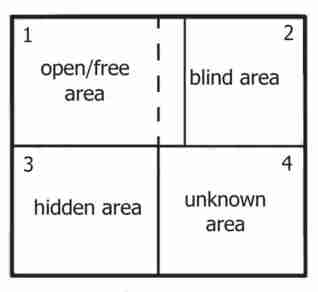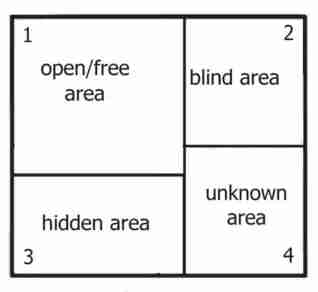4
The Johari Window is a tool for understanding and improving self-awareness particularly your awareness around how you relate to other people and how they perceive you. It also helps to describe how we develop interpersonal relationships. Knowing yourself is a critical aspect of Social Services Work because it makes us better helpers and improves our own self-care.
There are four Johari Window “regions”. Each of these regions contains and represents information (e.g. feeling, beliefs, attitudes, fears, values etc) that you know about yourself, that others know about you or that you don’t know about yourself or that others don’t know about you.
Watch the video below to learn about the Johari window. Think about what you know or don’t know about yourself. Think about what others know about you or what they don’t know. Do you think that there are things that others know about you that you don’t know about yourself? How open are you to hearing those things? Once you finish the video you can read more about it in the summary that follows.
Johari window four regions explained
- Open self: what is known by the person about him/herself and is also known by others
- Blind Self: what is unknown by the person about him/herself but which others know. We call this the blindspot
- Hidden Self: what the person knows about him/herself that others do not know.
- Unknown self: what is unknown by the person about him/herself and is also unknown by others

1. Open self
This is the information about you – i.e. your behavior, attitude, feelings, emotion, knowledge, experience, skills, views, values etc – that are known by you and known by others in the class. For example, you may describe yourself as someone who is a good writer. Your teacher may see this as well. It is known to both of you.
When you first meet someone, you don’t know a lot about each other. If you are looking to create a working relationship with that person, the goal will be to share what you know about yourself, and to learn about what others know about themselves.
2. Blind self
This is what is known about you by others in the class, but is unknown by you. For example, if someone told you that you tend to pull away whenever there is conflict in the group, but you never noticed that before, they have pointed out one of your “blindspots” (i.e. something about you that was known to someone else but not know to you).
This blind area is not a productive space for you but it can be minimized and to grow in the class it should be! The size of the open area can be expanded into the blind space, by asking for and actively listening to feedback from other group members.
This blind area could also be referred to as ignorance about oneself, or issues in which one is deluded (i.e. wrong). For example you may think that you are not very empathetic but others would disagree. We are not always the best judge of our own character.
A blind area could also include issues that others are deliberately withholding from you. For example, you may have a group member who is very upset by the way that you joke. You think you are being funny and building relationships but the joke is coming across rude to some people. Not telling you about this is deliberately withholding this blindspot from you.
Hidden self
This is the area that is known to you but not known by others. This hidden or avoided self represents information, feelings, aspect of your personality etc, that you know about yourself, but you don’t reveal to others. The hidden area could also include sensitivities, fears, hidden agendas, manipulative intentions, secrets – anything that a person knows but does not reveal, for whatever reason.
It’s natural for very personal and private information and feelings to remain hidden. A lot depends on how safe a person feels in a group. This will help determine how much they share and with whom. Some people overshare in inappropriate situations. Some people undershare. The key is to find the right balance for you to help establish the relationship in a professional and genuine way. As with feedback, some people are more resilient than others – care needs to be taken to avoid causing emotional upset. Just as it can be hard for people to hear feedback, it can be hard to learn how much to self-disclose. The process is related to maturity and self-actualization.
By telling others how we feel and other information about ourselves we reduce the hidden area, and increase the open area, which enables better understanding, cooperation, trust, team-working effectiveness and productivity. Reducing hidden areas also reduces the potential for confusion, misunderstanding, poor communication, etc, which all distract from and undermine team effectiveness.
Unknown self
This area contains information, feelings, abilities, experiences etc, that are unknown to you and unknown to others in the group. Examples include
- an ability or skill that you don’t even know you have because you were never given the opportunity, were never encouraged, lacked confidence to try, or were never trained to do. This is an exciting aspect of your personality as it suggests enormous potential!
- a fear that you don’t know that you have
- an unknown illness
- repressed or subconscious feelings
- conditioned behavior or attitudes from childhood
Many of us have elements of the unknown self as part of our personalities. If there are aspects of the unknown self that people feel may be interfering in their ability to grow and self actualize, one way to bring these out into the open may be to use mindful mediation or other traditional healing practices or counselling.
The chary below is a visual summary of how to expand the open area of ourselves within a group setting. Think about your goal for the semester, what you feel comfortable disclosing, how well you receive feedback, and how you’re going to apply these strategies to improve your communication style.

If you want to try an activity with your close friends and family that might help you on this journey and with your reflections in this class, try THIS ACTIVITY. You would not have to hand this in, but you could use it as a tool for your assignments in the course.
